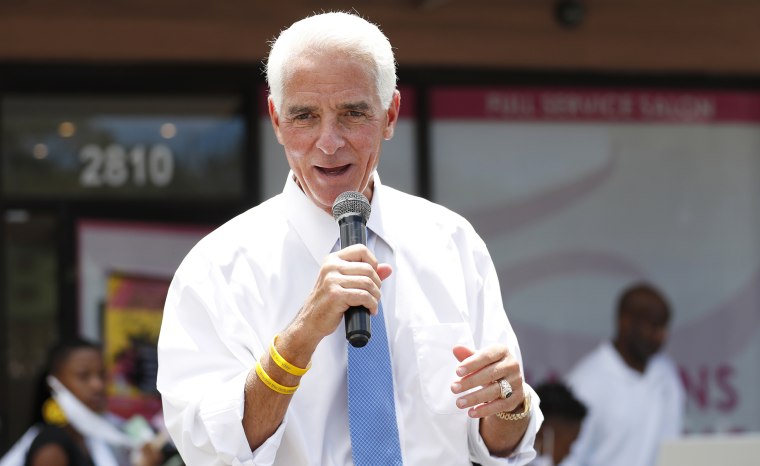Plenty of contemporary American politicians have blazed interesting trails, but when it comes to circuitous paths, few can match Florida's Charlie Crist.
In the 1990s, Crist was seen as a talented Republican state legislator, who was elevated by Jeb Bush to serve as the state's education commissioner. A couple of years later, Crist was elected as Florida's attorney general, and in 2006, he climbed the ladder again, becoming the state's governor.
It wasn't long, however, before the Republican ran into some trouble. Crist supported efforts to expand voting opportunities, for example, which was not a welcome move in his party. In 2009, the Floridian also expressed support for then-President Barack Obama's economic recovery plan -- which helped rescue the state's economy during the Great Recession -- which caused new rifts between Crist and his party.
In 2010, when Florida had an open U.S. Senate contest, Crist initially looked like the frontrunner for the job, right up until the GOP's far-right base decided Marco Rubio was a better ideological fit: the incumbent governor just wasn't enough of a conservative ideologue.
And thus began an unusual and unexpected evolution. After losing in a GOP primary, Crist ran as an independent Senate candidate in 2010, came up short, and soon after became a Democrat. He launched a comeback bid in 2014, running for governor against Republican Rick Scott, and losing by just one point: 48.1% to 47.1%.
Two years later, Crist bounced back once again, launching a Democratic congressional campaign, which he won, defeating a Republican incumbent. Crist successfully ran for re-election in 2018 and 2020.
And now, as the New York Times reported, he wants his old job back.
Representative Charlie Crist, Democrat of Florida, entered the race for governor on Tuesday, becoming the first challenger to Ron DeSantis, a Republican who raised his profile during the pandemic and is now one of the best-known governors in the country and a leading contender for his party's presidential nomination in 2024.
For those keeping score, this will be Crist's third gubernatorial race, following one relatively easy win as a Republican, and one very narrow defeat as a Democrat.
The path ahead won't be easy for the incumbent congressman. For one thing, Florida hasn't elected a Democratic governor since 1994. For another, Crist is likely to face some competitive primary rivals, with Agriculture Commissioner Nikki Fried (D) and Rep. Val Demings (D) eyeing gubernatorial campaigns of their own.
What's more, it's important to appreciate the degree to which Florida is starting to look more "red" than "purple." The 2018 election cycle, for example, was broadly great for Democratic candidates nationwide, but it was the same year in which Sen. Rick Scott (R) narrowly defeated an incumbent Democratic senator, and Gov. Ron DeSantis (R) narrowly prevailed despite running a widely derided campaign.
At the presidential level, Donald Trump won Florida in 2016 by 1.2%, and then four years later, the Republican ticket won the Sunshine State again -- this time by more than 3 percentage points.
This is not, in other words, a favorable political landscape for a Republican-turned-Democrat eyeing a statewide comeback bid.
Complicating matters just a little more, congressional Democrats currently have vanishingly small majorities in the U.S. House and U.S. Senate, and every incumbent who gives up their seat -- either to retire or to seek a different office -- creates another pick-up opportunity for Republicans.
All of which is to say, Crist flipped the political snowglobe this morning, and his decision will have considerable implications far outside his St. Petersburg-area district.
